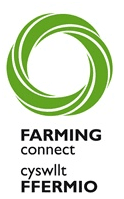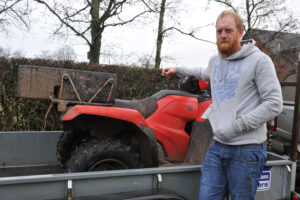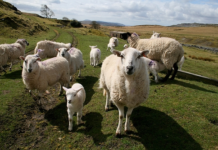 A Welsh shepherd is equipping himself with new skills and qualifications to take on the challenges that beckon for farming in the years ahead.
A Welsh shepherd is equipping himself with new skills and qualifications to take on the challenges that beckon for farming in the years ahead.
Welsh agriculture is on the cusp of a period of immense change says Rhys Jones, who lives in Garth, near Builth Wells.
He works as a shepherd on a 2,000-ewe upland farm in Powys, combining that role with running his own small flock of sheep on rented land and driving for a livestock haulier.
At 33, Rhys already has developed a diverse range of skills since he left school to work in agriculture, and skills which he also learned during a childhood immersed in farming; his mother, Eleanor, worked on her parents’ beef and sheep farm and his father, Medwyn, is a farm worker.
Rhys initially trained as an agricultural engineer and later spent a harvest season working in New Zealand but his ambition was to carve out a career in Welsh agriculture.
“I took a lambing job one February and have worked with sheep ever since,” he recalls.
With his background, farm skills and knowledge come as second nature but he recognises that there is always more to learn, and that certificates are needed to carry out some of those jobs safely and legally.
“You can always learn something new,” he acknowledges.
Rhys has therefore made considerable use of the subsidised and free courses available through Farming Connect.

With support from his Farming Connect local development officer, Gwen Price, he completed a Personal Development Plan.
This helped him to record his qualifications and skills, identify training goals, set out long term objectives and short-term goals, and to identify which training courses would help him improve existing skills, or learn new ones.
Since he embarked on the training, he has gained a certificate in safe use of sheep dip, which was 80% funded by Farming Connect, and completed a number of e-learning courses that have helped him with body conditioning scoring sheep, handling livestock, rearing calves, understanding livestock building design and ventilation and working safely with tractors.
“The e-learning courses were simple to access,” says Rhys. “I have a BOSS (Business Online Support Service) account and signed up to different modules through that.”
Certificates achieved are stored on Farming Connect’s secure online data storage tool ‘Storfa Sgiliau’ and he can easily access these at any time. You can also download a complete report of all your records in a single document.
Apart from having the certificates as proof of continuous professional development, the knowledge he has gained is being put to good use.
“We have been trying to cut down on using wormers in the sheep, using body condition scoring to do that,” he explains.
“And when I am on farms loading up livestock the safety course has really made me stop and think about how that can be done in a safe way.”
Rhys, who has two young children, Amelia, five, and two-year-old Ollie, with his partner, Sophie, says that mindset is important too in his own business, always avoiding potentially dangerous situations.
Next on his list is training in the safe use of an all-terrain vehicle (ATV), 40% funded by Farming Connect. Rhys has already completed the e-learning module, ‘Working Safely with ATVs’, which has refreshed existing skills, so he is now ready to complete the face-to-face training.
“Although insurance companies don’t ask for this training at the moment they could well do in the future,” says Rhys.
He left school with few qualifications, none of which were agriculture-focused, and that has reinforced his determination to make good use of the Farming Connect skills training.
“I left school with not a lot so I am always trying to do something to help fill that gap.
“Farming is changing, none of us know what that will look like in five, ten years’ time, so I think it is important to upskill, to have the training and qualifications that will help if ever my work situation changed.
Help keep news FREE for our readers
Supporting your local community newspaper/online news outlet is crucial now more than ever. If you believe in independent journalism, then consider making a valuable contribution by making a one-time or monthly donation. We operate in rural areas where providing unbiased news can be challenging. Read More About Supporting The West Wales Chronicle






















